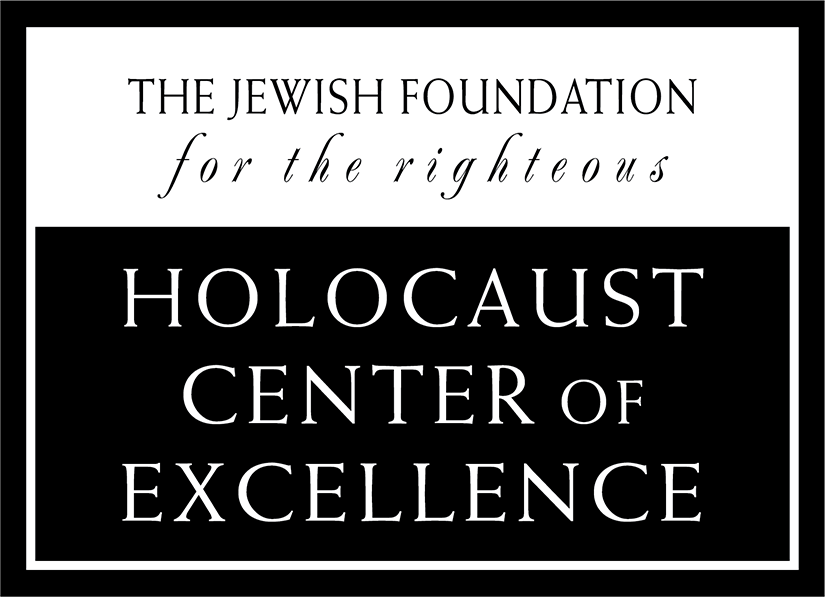Teaching the history and lessons of the Holocaust has increasing relevance as we deepen reflection and critical thinking about contemporary issues that affect societies around the world, such as the power of extremist ideologies, propaganda, the abuse of official power, and group-targeted hate and violence. Introducing the topic into your classroom your students gain empathy, and tools that highlight the value of promoting human rights, ethics, and civic engagement that bolsters human solidarity.
Our educational services enhance classroom units and help educators meet and exceed the Illinois Holocaust and Genocide Education Mandate, Illinois Civics Mandates for Middle and High Schools, Illinois Priority Learning Standards in Social/Emotional Learning, Common Core State Standards, and the C3 Framework for Social Studies. We offer the below resources to guide teaching.
Want to hear more about the Museum’s student & educator programs? Sign up for our educator newsletter >>
Student Field Trips
Field trips to Illinois Holocaust Museum & Education Center create opportunities for students in grades 3-12 and undergraduates to engage with the history and lessons of the Holocaust through age-appropriate experiences.
On-Site Field Trips
On-site field trips engage student in immersive environments and interactive learning experiences facilitated by trained Museum Docents. On topics ranging from the history of the Holocaust, civics, human rights, and social justice, students explore world-class exhibitions and learn to make meaningful connections between history and their world today.
Museum Field Trips
Virtual Field Trips
Virtual field trips feature experiential technology, online interactives, and compelling stories. Students explore their role in empowering and creating community through the lens of universal human and civil rights. Online activities may be completed individually, as a class, or a combination of the two and allow flexibility for use in traditional, remote, and hybrid learning environments.
Virtual Field Trips
Teaching Resources for Educators
Design meaningful, age-appropriate lessons and activities around topics connected to the Holocaust, genocide, civics, and social justice using these resources:
Teaching Trunks
Teaching trunks provide texts, DVDs, teaching posters, replica artifacts from Chicagoland Holocaust and genocide survivors, and suggested learning activities for grades K-12 in a spiraled learning sequence. Teaching trunks may be borrowed for classroom use and ship anywhere in the United States at no cost to the school.
Teaching Trunks
Virtual Teaching Trunks
Virtual teaching trunks offer accessibility and flexibility to educators teaching in remote and hybrid environments. Virtual teaching trunks include access to e-books and digital texts, documentaries, digital artifacts from Chicagoland Holocaust Survivors, and suggested learning activities.
Virtual Teaching Trunks
Virtual Guides & Activities
Educators covering sensitive topics may find the below resource list helpful.
Virtual Resources For Students & Educators
Survivor Profiles
Learning about individual stories of survival brings a human element to Holocaust curriculum. Our Survivor profiles highlight Chicagoland Survivors and their experiences – one story at a time.
Survivor Profiles
Professional Training and Development for Educators
Illinois Holocaust Museum & Education Center offers in-person and virtual professional development opportunities for educators in K-12 schools and college settings on topics including the Holocaust, genocide, civics, social justice, and social/emotional learning. Professional development opportunities include full-day, evening, and 90-minute workshops during the school year as well as an intensive Summer Institute for Educators. The Museum is an approved professional development provider in the state of Illinois and awards ISBE Clock Hours.
Upcoming TrainingsRecordings from Past TrainingsIn-Session Trainings
Student Leadership Opportunities
Student Leadership Days and College Leadership Summits challenge students to not only find their voices, but to reflect and act on what they can do to make the world a better place for themselves and others. By engaging in transformational educational programs, students are empowered to become advocates for change and grow into leaders who emphasize compassion, advocacy, and responsibility.
Student Leadership DaysCollege Leadership Summits

Photo credits: Danyel Duncan, Robert Kusel, Robin Subar
